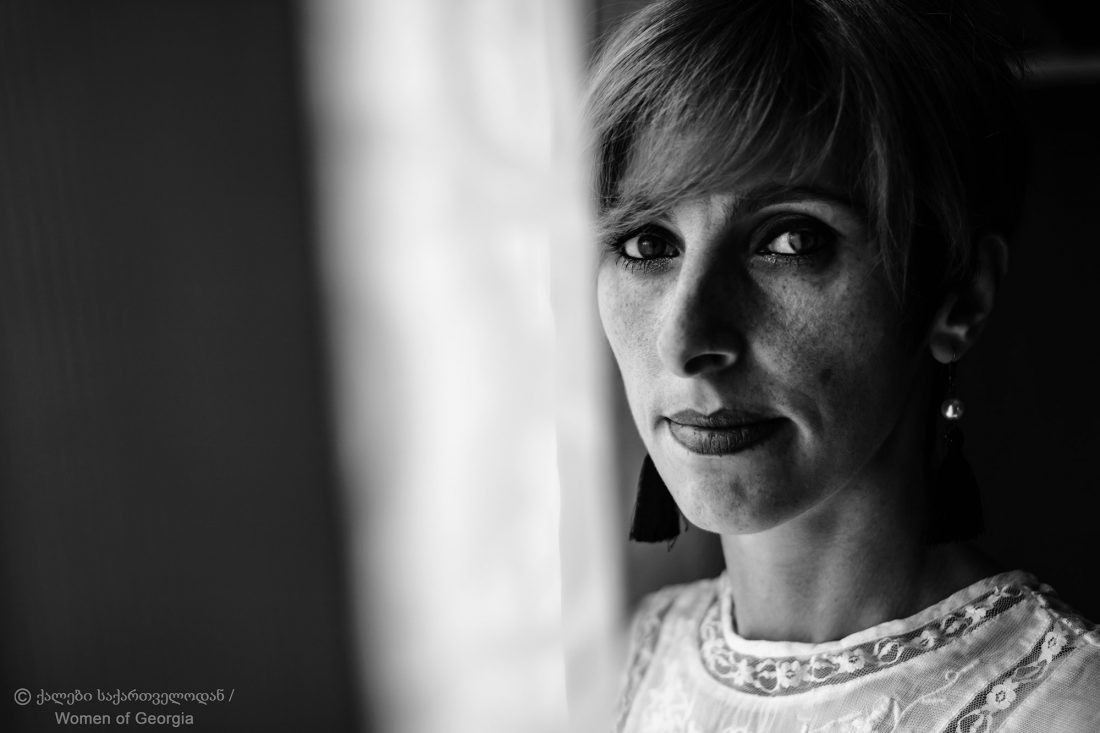Miranda Mazmanova, 38 years old, Batumi
”I got arrested in 2009. I was convicted with article 260. I was sentenced to 10 years, spent 3 years and 8 months there and came out with an amnesty. My problems started after I was out of prison. I’d remark, if they wanted to punish me, they should make me free. I had to take care of everything – new house, rent, job… in prison you don’t have such problems. You have a roof over your head. You have your bed, cigarettes, food and in general, you don’t have to struggle for yourself. Outside there are a lot of problems to handle. Who turned out actually punished? Not me. In fact, my family, my children were the ones who did. My mother would come and stand in line for hours to see me or to send me a package. I think they were more punished than me, the prisoner. During my stay in prison, the biggest problem was me being away from my children and family. I had two children back then and my mother was taking care of them. Living without my children was so difficult for me, that I didn’t even notice any other inconveniences. Probably there was something, but not important enough to compare. Days and nights felt very long because I couldn’t see my children. Every day in prison is the same, like outside. You’re just locked up, you have your restricted space to move and you can’t get out of it. The attitude is also normal. It’s nothing like they show you in movies – beating, big troubles, nothing like that happens. We could argue and gossip outside as well, so every day is the same inside.
When I got out of prison I had nothing. They took everything I had and I started my life over. Nowadays I live in Urekhi’s temporary shelter. The building is in the City Hall’s subordination and is divided into two parts – one part for the beneficiaries who only come to sleep and the other is where we live with four other families. We came here five years ago when I was without a roof with my little baby. I have three children and the youngest was 8 months old. We lived in a rented house in extreme poverty. I didn’t have any income but somehow, we weren’t able to receive social vulnerability status. I was breastfeeding the baby, but since I didn’t have any food I couldn’t feed the child. I went to the City Hall with my baby and explained my situation, that I didn’t have anything to even eat and that I had actually written the statement to receive the social status many times, and they refused. There was a program for socially vulnerable children up to one year to receive food and that was the main reason I wanted to receive the status to get food for my child. They told me it was out of their competence and rejected it again. Then one of the social agents helped me and even though I didn’t receive the status, they saw my poverty and brought food and medicine for the baby. I couldn’t pay the rent and we were evicted, so we had to move from one rented house to another. I went to City Hall one more time and asked them to let us live in the shelter. I knew about the building and that there were free rooms. They refused again. I called TV reporters to come and talk about it. We had a serious fight. One of the City Hall employees told me that reporters couldn’t do anything. Then they offered me money for 2-3 months to rent a flat and until that I could make another request for the social status and they would help me. That was more than enough for me. I was there with my baby, telling them he was dying from hunger and asked for help and they answered that it was out of their competence. I told them, that now I didn’t want their money or help. I wanted to get a room which I requested. After all of this fight and discussions, we have been moved here.
 Seven of us have been moved on the third floor in nine square meters: my husband, three children, my brother-in-law, and my mother-in-law. They restrict you in every possible way to avoid you staying there. But if you have to choose between living on the street or here, you’d agree to live in a four-square-meter room. There were two beds, one for my mother-in-law and my eldest daughter and another for me and the baby. The rest of us were sleeping on the floor on mattresses. If I had to get up at night, I had to be very careful not to wake up someone. But at the same time, it was a paradise for me. We had a roof over our heads. They saw that I was still not leaving, and eventually, they understood that I really didn’t have anywhere to go, so they gave a separate room to my mother-in-law.
Seven of us have been moved on the third floor in nine square meters: my husband, three children, my brother-in-law, and my mother-in-law. They restrict you in every possible way to avoid you staying there. But if you have to choose between living on the street or here, you’d agree to live in a four-square-meter room. There were two beds, one for my mother-in-law and my eldest daughter and another for me and the baby. The rest of us were sleeping on the floor on mattresses. If I had to get up at night, I had to be very careful not to wake up someone. But at the same time, it was a paradise for me. We had a roof over our heads. They saw that I was still not leaving, and eventually, they understood that I really didn’t have anywhere to go, so they gave a separate room to my mother-in-law.
There is also another room, it was a library before. It’s absolutely free. I have been struggling for a very long time to get this room so that kids have their own space to study and sleep. My daughter will be 16 soon and my son is 12 years old. Moreover, they are not planning to give that room to anybody else. I told them if it happens and you will need that room for somebody, there’s no need to even tell me, I’ll vacate the room immediately and let them live there. I know exactly how it is to be living on the streets and I will never choose my comfort over someone being outside. They tell me that I’m trying to expand. It’s an empty room, why is it locked? I understand why they are doing that, they want me to leave. I would never stay here if I had the possibility to pay for rent. If I left, I’d be in the same state as I was before.
Our problem is that after summer my husband and I were left without our jobs. On the season, I work as a waitress, or if someone needs a cleaner. Two years ago, I worked as a manager in a bar. I don’t choose jobs, I do anything I can as soon as something appears. Last year I opened a cafe in front of our house and after the New Years, I had to close it. There are a lot of hungry people and it became more charity than business. When you know, people are hungry and when you see them walking on the street and staring at food, it’s impossible not to feed them.
After I left jail, the first to support and help me was the ”Institute of Democracy”. I got all kinds of encouragement from them. I learned to handcraft in prison. After some time, my work got better and better. Some of the Ideas I took from the internet and some of them I did with my own imagination and I started to work on handmade things. They financed me and I had some kind of income from it. We got an exhibition too. Although they have finished working with me and I’m no longer their beneficiary, they still help me.
 I worked in the charity center ”Ialkani”. It’s a center where there’s homeless and socially vulnerable children coming every day, children whose parents are working and they are left without any supervision all day long. My children were also beneficiaries of this center and I found out that there are some volunteer teachers who teach children English language, music, dancing, etc. I talked to the director of the center and asked for permission to teach children handcrafting. They agreed and I was there 3 times a week. Unfortunately, I’m out of materials and can’t do that anymore. This material was bought by the ”Institute of Democracy” and by the Center of Crime Prevention. We were working with beads, making some necklaces, flowers, trees. I worked more than a year as a volunteer, we had exhibitions in Boulevard and invitations on the events. Then the crisis has started and our sales decreased.
I worked in the charity center ”Ialkani”. It’s a center where there’s homeless and socially vulnerable children coming every day, children whose parents are working and they are left without any supervision all day long. My children were also beneficiaries of this center and I found out that there are some volunteer teachers who teach children English language, music, dancing, etc. I talked to the director of the center and asked for permission to teach children handcrafting. They agreed and I was there 3 times a week. Unfortunately, I’m out of materials and can’t do that anymore. This material was bought by the ”Institute of Democracy” and by the Center of Crime Prevention. We were working with beads, making some necklaces, flowers, trees. I worked more than a year as a volunteer, we had exhibitions in Boulevard and invitations on the events. Then the crisis has started and our sales decreased.
I hate the unfairness of injustice. Poverty is a very sensitive topic for me and I always have to fight and argue about it. I’m disappointed by people’s attitude. I didn’t have a happy life either, but I didn’t become mean. You always see injustice, poor people who are hungry and they are taking the last bite of them. Here in the shelter, beneficiaries didn’t get what they were entitled to, food provided to them was always less than it should have been.
People brought many things here as a charity, but poor people didn’t even receive a quarter of it. I was always having fights about it. I’ve been told it was none of my business. Of course, it was my business. When you see that kind of poverty every day, if you have something inside your heart, you can’t turn a blind eye to it. Beneficiaries didn’t raise their voices and you can’t judge them. They don’t have any other choice. If they complained, they’ll be thrown out. In fear of returning to the streets, they don’t say anything. Finally, we got a new director, who has an amazing personality; he’s doing everything he can and the situation is much better now.”
Author: Nino Gamisonia
Photo: Nino Baidauri

